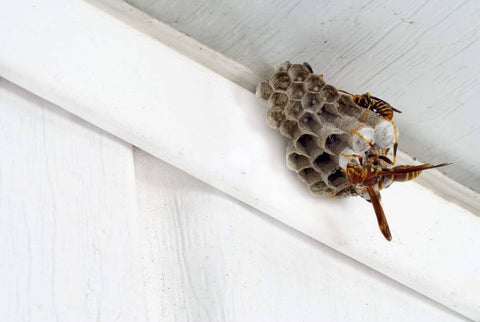When wasps and other stinging insects buzz near you, it can be unsettling. These bugs are known for their painful stings, and as summer comes to an end, there’s an increase in their aggressiveness. Knowing why these bugs are more aggressive in the fall can help you avoid an unpleasant interaction. Check out what causes these stinging insects to be aggressive and tips to avoid their sting.
1. Limited Food Sources

In fall, wasps begin to lose access to their food sources. During summer, adult wasps feed insects to larvae who in return produce a sweet substance for the adults to eat. When the queen stops laying eggs in autumn, the adults lose access to their sweet treat. Wasps also get protein from plant nectar. When plant populations decline in fall, wasps won’t have as much nectar to eat. Because resources are low, wasps are hungry and that can make them more aggressive.
2. Protecting the Queen

Wasps also become aggressive when trying to protect the queen. In fall, the colony starts preparing for winter. The queen is usually the only member that survives winter conditions. The fate of new colonies rests in the survival of the queen. Wasps know they have to protect the queen, so any potential threat can cause them to spring into action. These stinging insects release pheromones that alert other wasps to danger, which can lead to multiple wasps attacking at once.
3. They Feel Threatened

Wasps can also become aggressive when they feel threatened. This can be heightened in fall, but it can happen anytime during their active season. When wasps feel threatened, they will defend themselves, usually through stinging. Swatting at them can provoke them to sting. They can also be territorial and will become defensive if their nest is disturbed. Yellow jackets are known to attack if their ground nest is run over by a lawn mower.
Tips to Avoid Wasp Stings

When you head outdoors, you don’t want to have to worry about wasps and their stings. Check out a few tips to help you avoid getting stung by a wasp.
- Don’t Swat at Wasps: When a wasp is flying near you, you don’t want to swat at it. This will only make them feel threatened, increasing the chance of them trying to sting you. Instead, try to move away slowly. If they land on you, do your best to remain still until they fly away.
- Be on the Lookout for Nests: Since wasps are territorial of their nests, you’ll want to be on the lookout for them. They often build nests in shrubs and trees, on doorframes and porch ceilings, in attics, and under eaves. When mowing your lawn, check for holes in the ground that could be the nest entrance. These are often found near the base of trees.
- Avoid Strong Fragrances: When heading outdoors, you’ll want to avoid wearing perfumes or colognes with strong fragrances. They are most attracted to floral or sweet scents.
- Choose the Right Outfit: Stinging insects are attracted to floral prints and bright colors, so you’ll want to be careful when choosing your outfit. Covering your skin can also help to prevent stings.
- Cover Your Food & Drinks: If you plan on enjoying a meal outside, you’ll want to keep your food and drinks covered. Wasps are searching for food and your tasty treats could attract them. Covering your drinks can also prevent wasps from falling in them and stinging you.
Though wasps can sting anytime, they are known for being more aggressive in fall. Understanding the changes in their behavior can help you take steps to avoid being stung. If wasps or other pests are giving you a fit, we’re here to help! Check out our Maggie’s Farm Simply Effective™ Pest Control products for a more environmentally and family-friendly solution when used as directed.
